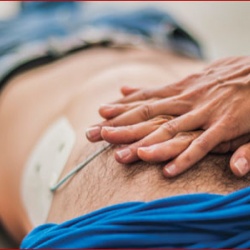For Defibrillator Use, Be Aware of Good Samaritan Laws

Good samaritan providing aid, via Google Images
Coming to the aid of strangers in need of urgent medical attention following sudden cardiac arrest is the primary motivation for bystanders using AEDs, or automated external defibrillators.
These devices, as we spotlighted following the death of rock musician Tom Petty, are used to provide an electrical charge to a victim's heart that has stopped. They are conspicuously mounted on walls in public places, so that anyone can simply grab the easily-used machine on a moment's notice to provide life-saving assistance.
But another key to encouraging the use AEDs are Good Samaritan Laws, enacted by states to shield bystanders from possible legal liability. These laws are essential, and without their existence there'd be far fewer volunteers willing to help a stricken person.
While most people believe that Good Samaritan Laws provide effective protection from lawsuits if something went terribly wrong, that's only somewhat true. The fact is that protection varies from state to state, with some offering near blanket immunity and others that leave much to be desired.
Writing about AEDs last week made us want to take a closer look at this issue. But since this is a legal issue, we want to make it clear: We're not offering legal advice in any sense, or in any way. We just want to inform potential volunteers that there's a lot more to these laws than meets the eye, and depending on which state you're from the rules of engagement are different, so it'd be wise to learn more about this topic.
A good place to start is with the National Conference of State Legislatures, and their website page "State Laws on Cardiac Arrest and Defibrillators," which was updated in January. It contains links to all the states and the District of Columbia, which detail the extent of coverage. There are also links to third-party sites like this one with additional information on AED-Good Samaritan Laws.
While opinions may vary, roughly 40 states have decent legal protection because "negligence," or ordinary mistakes, is not actionable by anyone looking to sue. (These laws cannot prevent someone from filing suit; they just make it harder for someone to win, and as such, they provide a deterrent.) And there's a general consensus that five states in particular – Utah, Ohio, Maine, Oregon and Arizona – provide the best legal protection for good samaritans deploying AEDs on cardiac arrest victims. But again, it would be wise to learn more about these laws in your state, just to be safe.
Story Credit: https://www.acsh.org/news/2017/10/17/defibrillator-use-be-aware-good-samaritan-laws-11973


